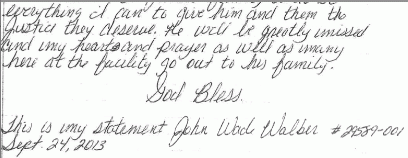Background: Gary White was a county commissioner
in Jefferson County, Alabama. Good friends with Les Siegelman, he
introduced Les's brother, [former] Alabama Governor Don Siegelman
to Richard Scrushy, a local Republican businessman. Because of
this, White became inextricably intertwined with Siegelman, who was
one of the biggest targets of the Rove-directed, heavily
politicized Department of Justice [DOJ].
Scrushy and Siegelman were later indicted and convicted on charges stemming from that relationship. According to affidavits provided by Gary [and Judy, who was also in the room] White was asked to perjure himself before a Grand Jury in order to make the case against Siegelman and Scrushy. White refused and the very next day, the DOJ started delivering subpoenas to build a case against him. White is serving ten years and has been moved most recently to Forrest City - Low, part of the federal prison complex in Forrest City, Arkansas. [BOP is Bureau of Prisons.]
This is installment #25. Links to the entire series at end of this article.
My guest today is frequent OpEdNews contributor, Judy White. Welcome back to OpEdNews, Judy.
JW: Thank you, Joan, for your continued interest.
If I may, I want to say that I recognize much of what I share with you in these discussions is about abuses that, while wrong and harmful, haven't - yet - resulted in Gary's death or my own. While Gary has been and remains in imminent danger because of medical abuse, we have not suffered the fate of James Hallford and his family. On Friday, September 20, 2013, Mr. Hallford was killed by our government through medical abuse at the hands of employees of the Federal Bureau of Prisons. No judge sentenced him to death, just as no death sentence has been imposed by any judge in the numerous other prisoners' deaths that Gary has known of, yet too many men - human beings - have been summarily executed through medical abuse.
Mr. Hallford was 51 years old. He was expecting to be released and return home in time to spend Christmas with his two children - children who will, instead, mark this Christmas as their first without a father.
JB: Tell us more, please.
Mr. Hallford had been transferred to Forrest City less than a month before his death. He had not even had orientation yet, although he had been to the prison's medical facility a number of times, including not one, but two attempts to get medical help on that Friday morning. With symptoms even someone without medical training would recognize as a heart-related medical emergency, Mr. Hallford was turned away and refused medical care, not once, but twice the day he died. The second time he sought help, the prison medical employees told him he was fine and that he could return the following Tuesday if necessary. About an hour later, he collapsed and died. Only one prison employee - Joe Crowder, who is not a prison medical employee - made any attempt to save his life, performing CPR and telling prisoners - not prison employees - to get a gurney and defibrillator.
According to those who were present when he collapsed, among his last words was the statement that he could not go to medical, that he had already been and was sent away. "I can't go to medical because I just left medical." And then he was dead.
JB: What did Hallford's last words mean? That's not clear to me.
JW: The message is that BOP employees, medical employees in particular, simply do not care if prisoners die, as they wrongfully withhold medical treatment. It isn't like the prisoners have the option to go to a doctor or hospital or get a second opinion - or even a first opinion, for that matter. Prisoners are at the mercy of government employees who have no mercy. They all recognize it could be them, that they could be the next medical emergency, that they could be the next dead prisoner.
Gary and I live with that reality every day, that Gary could die of medical abuse, and not only would no one try to save him, it would be caused by the direct acts of prison employees through withholding treatment they and real, actual doctors have acknowledged Gary needs.
Several prisoners, at some risk to themselves, have made voluntary statements about Mr. Hallford's death. I imagine that's pretty unusual. What can you tell us?
After his death, the prison seemed to go into "damage control" mode, likely trying to get their story together to protect the prison and its employees from accountability for the death of a 51-year old man who had been refused medical care on the very day he died. We know Gary's prison medical records have been changed to remove evidence of liability for what they have done and continue to do to him. We also know of another instance of a prisoner who died needlessly, who had been given an EKG that was not "read" by anyone until six months later, the day after his death. I would expect Mr. Hallford's medical records underwent some post-mortem modifications.
(Note: You can view every article as one long page if you sign up as an Advocate Member, or higher).






